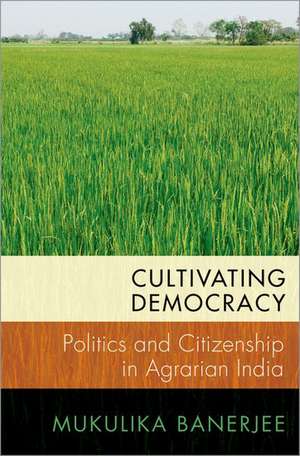Cultivating Democracy: Politics and Citizenship in Agrarian India: Modern South Asia
Autor Mukulika Banerjeeen Limba Engleză Paperback – 9 noi 2021
Din seria Modern South Asia
- 13%
 Preț: 176.27 lei
Preț: 176.27 lei - 13%
 Preț: 214.35 lei
Preț: 214.35 lei -
 Preț: 247.32 lei
Preț: 247.32 lei - 23%
 Preț: 140.87 lei
Preț: 140.87 lei - 13%
 Preț: 513.60 lei
Preț: 513.60 lei - 13%
 Preț: 163.62 lei
Preț: 163.62 lei - 12%
 Preț: 225.90 lei
Preț: 225.90 lei - 13%
 Preț: 163.62 lei
Preț: 163.62 lei - 13%
 Preț: 189.47 lei
Preț: 189.47 lei - 27%
 Preț: 372.55 lei
Preț: 372.55 lei - 10%
 Preț: 248.71 lei
Preț: 248.71 lei - 14%
 Preț: 224.47 lei
Preț: 224.47 lei - 16%
 Preț: 189.47 lei
Preț: 189.47 lei - 13%
 Preț: 355.77 lei
Preț: 355.77 lei - 10%
 Preț: 266.29 lei
Preț: 266.29 lei - 23%
 Preț: 139.28 lei
Preț: 139.28 lei
Preț: 163.42 lei
Preț vechi: 177.24 lei
-8% Nou
Puncte Express: 245
Preț estimativ în valută:
31.27€ • 33.44$ • 26.07£
31.27€ • 33.44$ • 26.07£
Carte disponibilă
Livrare economică 17-24 martie
Livrare express 13-19 martie pentru 38.26 lei
Preluare comenzi: 021 569.72.76
Specificații
ISBN-13: 9780197601877
ISBN-10: 0197601871
Pagini: 256
Dimensiuni: 236 x 157 x 20 mm
Greutate: 0.38 kg
Editura: Oxford University Press
Colecția OUP USA
Seria Modern South Asia
Locul publicării:New York, United States
ISBN-10: 0197601871
Pagini: 256
Dimensiuni: 236 x 157 x 20 mm
Greutate: 0.38 kg
Editura: Oxford University Press
Colecția OUP USA
Seria Modern South Asia
Locul publicării:New York, United States
Recenzii
Cultivating Democracy will be essential reading for anyone interested in the politics of citizenship in contemporary India, and in political change in West Bengal. It also serves as an effective reminder of the profound changes to Indian and West Bengal democracy and politics over the past decade.
Cultivating Democracy is well-written and easy to follow, making it accessible to a wide range of readers. It is also well-researched and well-argued, drawing on a variety of sources and providing comprehensive and nuanced understanding of the subject. Banerjee has done a great job of weaving together theoretical and empirical insights to provide a rich and nuanced perspective on politics and citizenship in rural India, challenging the dominant view of democracy and citizenship as simply a matter of formal political rights and representation. Overall, the book contributes to the literature on Indian politics, democracy and citizenship. Cultivating Democracy is recommended to anyone interested in understanding the complexities of politics and citizenship in the Global South.
This is a work of both theoretical sophistication and vivid ethnography that takes us into the everyday life of rural Bengal as we follow the rhythms and tempos of political allegiances, enmities, compromises, and hopes that portray the lived experience of democratic politics. With an eye on minor characters as well as major players in the political field Banerjee's receptivity to unforeseen events within the everyday, and her attention to the small events of history, together stitch theory and ethnography and make for unforgettable moments in the text. The author's commitment to the project of a democratic India, even and especially in these dark times, is evident in every scene, hopeful or not, that animate the book.
Mukulika Banerjee's book Cultivating Democracy makes a significant, if quieter intervention into a moment of complex crisis that Indian democracy finds itself in-a crisis in which free and fair elections are largely upheld alongside the serious erosion of democratic institutions and norms. The relentless attack on civil and political liberties, of Muslim minorities in particular, backed by an intensifying Hindu nationalism, makes Ambedkar's words prescient: "democracy in India is only a top dressing on an Indian soil which is essentially undemocratic".
Cultivating Democracy is well-written and easy to follow, making it accessible to a wide range of readers. It is also well-researched and well-argued, drawing on a variety of sources and providing comprehensive and nuanced understanding of the subject. Banerjee has done a great job of weaving together theoretical and empirical insights to provide a rich and nuanced perspective on politics and citizenship in rural India, challenging the dominant view of democracy and citizenship as simply a matter of formal political rights and representation. Overall, the book contributes to the literature on Indian politics, democracy and citizenship. Cultivating Democracy is recommended to anyone interested in understanding the complexities of politics and citizenship in the Global South.
This is a work of both theoretical sophistication and vivid ethnography that takes us into the everyday life of rural Bengal as we follow the rhythms and tempos of political allegiances, enmities, compromises, and hopes that portray the lived experience of democratic politics. With an eye on minor characters as well as major players in the political field Banerjee's receptivity to unforeseen events within the everyday, and her attention to the small events of history, together stitch theory and ethnography and make for unforgettable moments in the text. The author's commitment to the project of a democratic India, even and especially in these dark times, is evident in every scene, hopeful or not, that animate the book.
Mukulika Banerjee's book Cultivating Democracy makes a significant, if quieter intervention into a moment of complex crisis that Indian democracy finds itself in-a crisis in which free and fair elections are largely upheld alongside the serious erosion of democratic institutions and norms. The relentless attack on civil and political liberties, of Muslim minorities in particular, backed by an intensifying Hindu nationalism, makes Ambedkar's words prescient: "democracy in India is only a top dressing on an Indian soil which is essentially undemocratic".
Notă biografică
Mukulika Banerjee is Associate Professor in Social Anthropology at the London School of Economics. Her books include Why India Votes?, The Pathan Unarmed, The Sari, and the edited volume Muslim Portraits.
